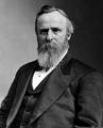 Rutherford Birchard Hayes (4 October 1822 – 17 January 1893) was an American lawyer, Brevet Major General, and Republican politician, who was elected as the 19th President of the United States. Hayes was in office from 1877 to 1881.
Rutherford Birchard Hayes (4 October 1822 – 17 January 1893) was an American lawyer, Brevet Major General, and Republican politician, who was elected as the 19th President of the United States. Hayes was in office from 1877 to 1881.
Republicans were strong abolitionists and they received enormous support from homeopaths, many of whom were active in the abolitionist movement. Rutherford B. Hayes continued the tradition of supporting homeopaths. He appointed homeopath Dr. Tullio Sussara Verdi who had attended to Abraham Lincoln and Ulysses S. Grant, to the National Board of Health in 1879.
During the American Civil War, Hayes was commissioned as a Major in the 23rd Ohio infantry regiment. There he mentored a young soldier, William McKinley, who would later become Hayes’ political protégé and a future U.S. President.
Brigadier General Eliakim Scammon was Rutherford Hayes’ commanding officer in the 23rd Ohio Regiment. His brother, Jonathan Young Scammon, instituted Chicago’s Swedenborgian Church of the New Jerusalem, and introduced homeopathic medicine to the Midwestern city through a new hospital, the Hahnemann homeopathic hospital, on land that he donated.
After the Civil War, President Hayes was a frequent visitor to Long Branch, a New Jersey beach resort town that became a popular destination due to its association with water and homeopathy.
In 1878, President Hayes signed a Quarantine Act to deal with the recurring Yellow Fever epidemics, incorporating information from the American Institute of Homeopathy and based on the success of homeopaths in treating this disease.


Leave A Comment